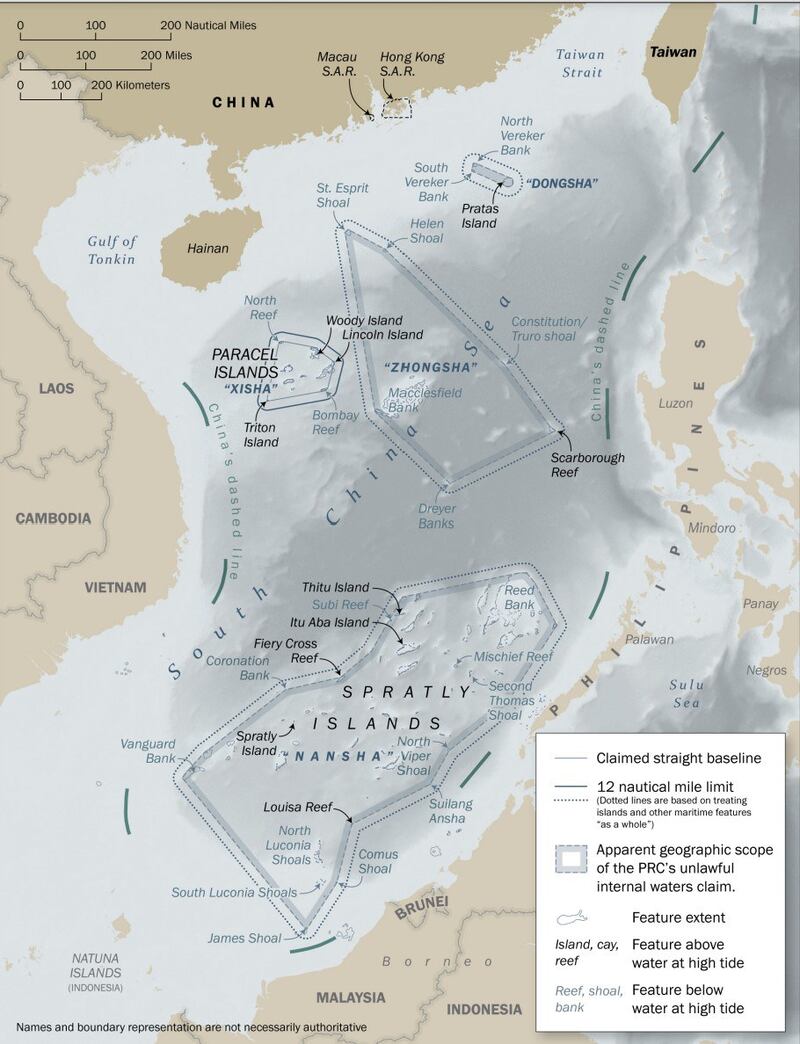China appears to be shifting from the so-called “nine-dash line” toward a new legal theory to support its expansive claims in the South China Sea, although analysts say its alternative is also problematic under international law.
In comments to reporters last week, Malaysian Foreign Minister Saifuddin Abdullah said Beijing now “speaks less of the ‘nine-dash line’ and more often of the ‘Four Sha’.” He said the shift toward has been witnessed by member countries of the Association of Southeast Asian Nations (ASEAN) and “is even more serious” than the old claim.
“Four Sha,” or Four Sands Archipelagos, are the four island groups in the South China Sea that Beijing claims to hold “historical rights” to. China calls them “Dongsha Qundao,” “Xisha Qundao,” “Zhongsha Qundao,” and “Nansha Qundao.” Internationally, they are known as Pratas Islands, Paracel Islands, the Macclesfield Bank area and Spratly Islands.
The concept they may be eclipsing, the nine-dash line, is a U-shaped line encircling most of the South China Sea that China has been using to demarcate its sovereignty over the sea.
An international tribunal in 2016 invalidated the line saying China has no legal basis for it. Although Beijing rejected the ruling, other nations have endorsed it.
“The nine-dash line has proven to be a really easy target for critics of China’s South China Sea claims,” Julian Ku, a professor at the Hofstra University School of Law in Long Island, New York State, said.
“It was also directly considered and rejected by the South China Sea Arbitral Tribunal in 2016.”
“China’s Four Sha theory was not directly considered by the tribunal ruling, although it would also be difficult to support,” Ku said, adding: “Still, it is a less dramatic claim and it is also not based solely on historical claims.”

‘Slowly emerging’
Bill Hayton, a journalist-turned-scholar who wrote an acclaimed book on the South China Sea, said the Four Sha theory has been “emerging slowly, with a boost after the arbitration tribunal ruling.”
“The Four-Sha is an attempt to develop an UNCLOS-like justification for control over the South China Sea with some sort of legal basis,” he said. UNCLOS is the acronym for the UN Convention of the Law on the Sea.
“But everyone else is still rejecting it,” Hayton added.
Each of the archipelagos in the Four Sha consists of a large number of scattered outlying features, most of which are submerged under water. Beijing insists that they are to be treated as whole units for purposes of sovereignty and maritime entitlements.
The Zhongsha Qundao, or Macclesfield Bank area, is actually entirely underwater, and not an archipelago, experts say.
Ku from the Hofstra University said although the first-known attempt by Chinese officials to advance Four Sha as a new legal theory was recorded at a closed-door meeting with U.S. State Department officials in 2017, “the Four Sha are not new to China’s claims in the South China Sea.”
The Law on the Territorial Sea and the Contiguous Zone of the People's Republic of China, adopted by China in 1992, declared the four island groups. They were also mentioned in a 2016 white paper issued by China disputing the Philippines’ claims in the South China Sea arbitral process.
“These new Chinese legal justifications are no more lawful than China’s nine-dash line claim but it is more confusing and less simple to criticize,” Ku said.
A U.S. State Department report on China's South China Sea claims that was published this month, ' Limits in the Seas', does not mention Four Sha concept. But it does analyze the People's Republic of China (PRC) sovereignty claim over Dongsha, Xisha, Zhongsha and Nansha. It concludes that China's assertions of sovereignty are "unlawful."
Change of approach?
The apparent shift from nine-dash line to Four Sha has caused concern among South China Sea claimants.
Malaysia is among the ASEAN nations’ whose territorial claims overlap with China’s in the South China Sea. The others are Brunei, the Philippines and Vietnam. While Indonesia does not regard itself as party to the South China Sea dispute, Beijing does claim historic rights to areas overlapping Indonesia's exclusive economic zone.
In a response to a question posed by a reporter from BenarNews, a sister agency of RFA, Malaysian Foreign Minister Saifuddin told reporters last Thursday that “they (China) have changed from using mostly the nine-dash line narrative to the Four Sha. I can see some policy change in the way they approach the South China Sea.”
“It is yet to be seen whether the Four Sha (approach) is more aggressive or the nine-dash line (is) more aggressive,” Saifuddin said.
Ku said he did not think the Four Sha claim would necessarily lead to more aggressive actions by China, but “it provides another justification for aggressive actions that it might want to take.”
Hayton, meanwhile, saw potential for escalation in the South China Sea as Four Sha concept “has given Chinese actors some new confidence that they can make a plausible case. We've seen a lot more assertive actions recently, like China’s harassing oil and gas off Malaysia and Indonesia,” he said.
In a related development, Chinese Foreign Minister Wang Yi has reiterated that his country will not use its strength to "bully” its smaller neighbors. He also highlighted the importance of settling disputes in the South China Sea peacefully.
"Stressing only one side's claims and imposing one's own will on the other is not a proper way for neighbours to treat each other and it goes against the oriental philosophy of how people should get along with each other," Wang told a virtual forum organized by the Chinese embassy in the Philippines on Monday.
Muzliza Mustafa of RFA-affiliated BenarNews in Kuala Lumpur contributed to this report.
